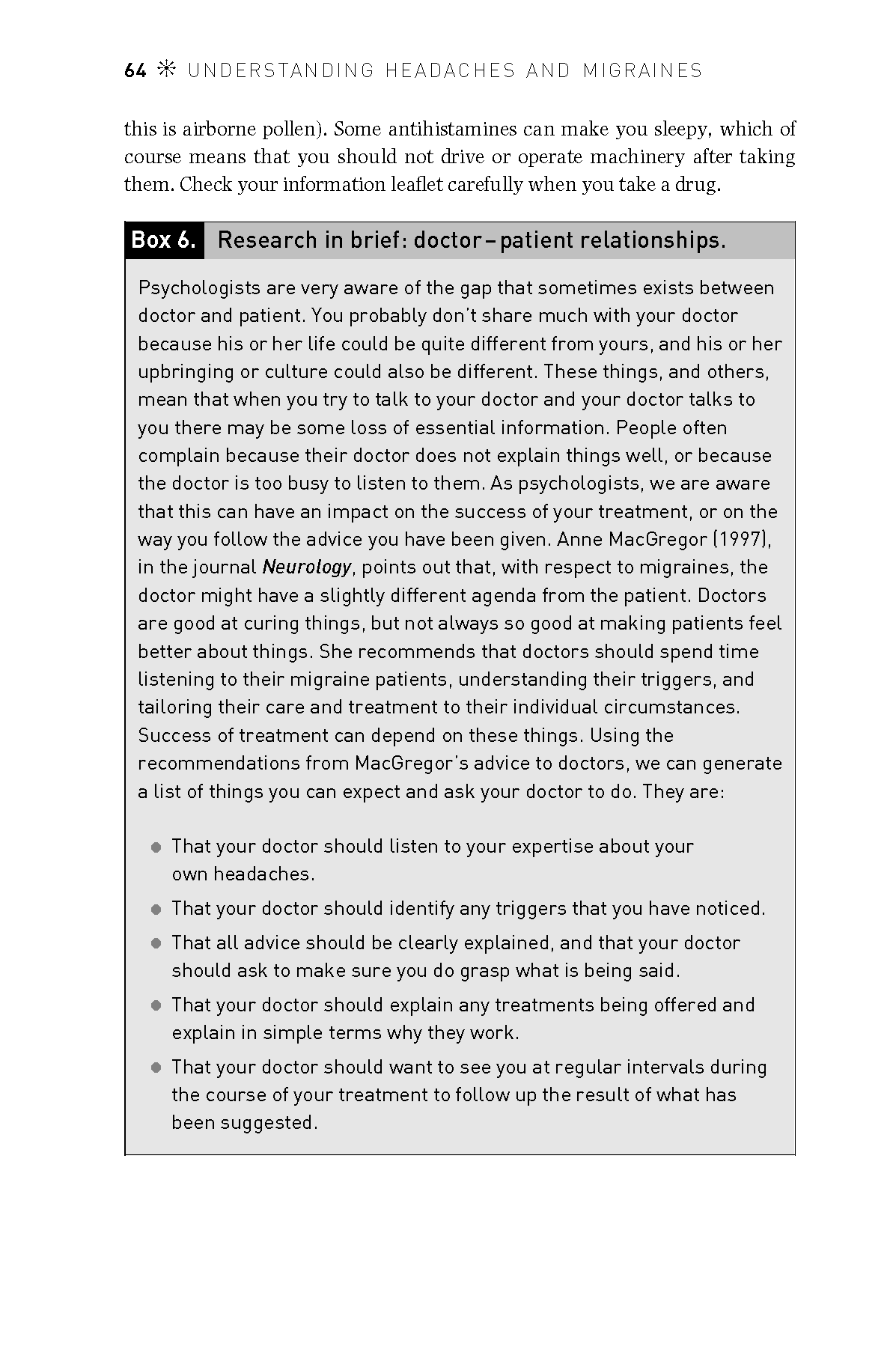UHAM081

64 1 UNDERSTANDING HEADACHES AND M IG RAI N ES this is airborne pollen). Some antiłiistamines can make you sleepy, which of course means that you should not drive or operate machinery after taking them. Check your Information leaflet carefully when you take a drug.
Box 6.
Research in brief: doctor-patient relationships.
Psychologists are very aware of the gap that sometimes exists between doctor and patient. You probably don't share much with your doctor because his or her Life could be quite different from yours, and his or her upbringing or culture could also be different. These things, and others, mean that when you try to talk to your doctor and your doctor talks to you there may be some loss of essential information. People often complain because their doctor does not explain things well, or because the doctor is too busy to listen to them. As psychologists, we are aware that this can have an impact on the success of your treatment, or on the way you follow the advice you have been given. Annę MacGregor (1997), in thejournal Neurology, points out that, with respect to migraines, the doctor might have a slightly different agenda from the patient. Doctors are good at curing things, but not always so good at making patients feel better about things. She recommends that doctors should spend time listening to their migraine patients, understanding their triggers, and tailoring their care and treatment to their individual circumstances. Success of treatment can depend on these things. Using the recommendations from MacGregors advice to doctors, we can generate a list of things you can expect and ask your doctor to do. They are:
That your doctor should listen to your expertise about your own headaches.
• That your doctor should identify any triggers that you have noticed.
• That all advice should be clearly explained, and that your doctor should ask to make surę you do grasp what is being said.
• That your doctor should explain any treatments being offered and explain in simple terms why they work.
• That your doctor should want to see you at regular intervals during the course of your treatment to follow up the result of what has been suggested.
Wyszukiwarka
Podobne podstrony:
UHAM061 44 * UNDERSTANDING HEADACHES AND M IG RAI N ES mercury is emitted, which can be breathed in.
UHAM035 18 * UNDERSTANDING HEADACHES AND M IG RAI N ES One particular problem in people in their lat
UHAM037 20 * UNDERSTANDING HEADACHES AND M IG RAI N ES episodes in Life and the onset of a headache.
UHAM039 22 * UNDERSTANDING HEADACHES AND M IG RAI N ES African-Caribbean people or Asian people (in
UHAM041 24 * UNDERSTANDING HEADACHES AND M IG RAI N ES is in intensity rather than quality. In all o
UHAM043 26 * UNDERSTANDING HEADACHES AND M IG RAI N ES A common migraine aura involves a scintiUati
UHAM045 28 * UNDERSTANDING HEADACHES AND M IG RAI N ES own migraine triggers, perhaps by maintaining
UHAM047 30 * UNDERSTANDING HEADACHES AND M IG RAI N ES it. Aft er a migraine attack, I can f ee L w
UHAM049 32 * UNDERSTANDING HEADACHES AND M IG RAI N ES get a full-blown attack. However, I do stillf
UHAM051 34 * UNDERSTANDING HEADACHES AND M IG RAI N ES can mean that I have to dnve everyone around
UHAM055 38 * UNDERSTANDING HEADACHES AND M IG RAI N ES Stress, food, drink and light are aLL common
UHAM057 40 * UNDERSTANDING HEADACHES AND M IG RAI N ES being served the wrong dish in a restaurant a
UHAM059 42 * UNDERSTANDING HEADACHES AND M IG RAI N ES placed on the muscles may leadto chronic head
UHAM065 48 * UNDERSTANDING HEADACHES AND M IG RAI N ES The Peruvian guide and bus driver were concer
UHAM067 50 * UNDERSTANDING HEADACHES AND M IG RAI N ES solve the problem completely. Caffeine is onl
UHAM073 56 * UNDERSTANDING HEADACHES AND M IG RAI N ES she has ruled out all of the dangerous or lif
UHAM075 58 * UNDERSTANDING HEADACHES AND M IG RAI N ES actually take your mind off your headache whe
UHAM097 80 * UNDERSTANDING HEADACHES AND M IG RAI N ES • Do not scare yourself by
więcej podobnych podstron